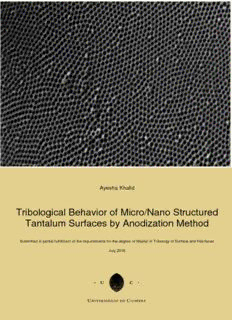
Ayesha Khalid PDF
Preview Ayesha Khalid
Ayesha Khalid Tribological Behavior of Micro/Nano Structured Tantalum Surfaces by Anodization Method Submitted in partial fulfillment of the requirements for the degree of Master in Tribology of Surface and Interfaces July 2016 ii DEPARTAMENTO DE ENGENHARIA MECÂNICA Tribological Behavior of Micro/Nano Structured Tantalum Surfaces by Anodization Method Submitted in Partial Fulfilment of the Requirements for the Joint European Master in Tribology of Surfaces and Interfaces Author Ayesha Khalid Advisors Professor Amilcar Ramalho Professor Sandra Carvalho Jury Bruno Trindade President Professor at University of Coimbra Paulo Ferreira Professor at University of Texas Vowels Stephen Muhl Professor at National Autonomous University of Mexico Amilcar Ramalho Advisor Professor at University of Coimbra In the framework of Joint European Master in Tribology of Surfaces and Interfaces Coimbra, July, 2016 "When I'm working on a problem, I never think about beauty. I think only how to solve the problem. But when I have finished, if the solution is not beautiful, I know it is wrong." (R. Buckminster Fuller) Acknowledgements ACKNOWLEDGEMENTS As I come to the end of my thesis and put the final touch of acknowledging all the people who helped and supported me through this I reflect back to this period of intense learning, not just on academic level but also on a personal level. I would first and foremost like to express my profound gratitude to my supervisors Professor Sandra Carvalho and Professor Amilcar Ramalho who were always available whenever I needed guidance. I am grateful to Professor Albano for his help, patience and support and for facilitating me in every way possible. I am especially thankful to Professor Amilcar for his valuable guidance and for inspiring me to think out of the box in scientific research. I am also thankful to Cristiana Alves for her support and guidance. She was a valuable mentor on my visits University of Minho for experimental work. I am thankful to the TRIBOS consortium for providing me with the opportunity of pursuing my master studies under this prestigious program. A special thanks to all my TRIBOS mentors Professor Ardian Morina, Professor Mitjan Kalin and Professor Bruno Trindade for their support. Lastly, I would like to acknowledge the iron support of my family, especially my mother and my fiancé, through this journey. I thank you for being my cheerleaders in hard times and pushing me to do my best. Ayesha Khalid iii iv 2016 Abstract ABSTRACT Tantalum is a metal which has shown to have excellent biocompatibility and bioactivity, making it a potential material for dental implant. Nano texturing can improve the performance of Ta dental implant as it promotes faster osseointegration. Nano texturing changes surface roughness which affects the tribological behavior. An electrochemical process called anodization was used to modify the surface of tantalum by introducing highly ordered nano pores on its surface. Anodization is a process that involves several parameters which can be easily modified to produce controlled surface texturing. The applied potential has a propotional relationship to pore diameter and Ta O film thickness. Higher applied potential leads to larger pore diameters 2 5 and thicker oxide layer. For the purpose of this thesis, tantalum was anodized at three different potentials, namely 15, 25 and 50 V. The purpose of this thesis was to test the effect of surface roughness induced by anodization, on the tribological properties of Ta, particularly its static friction behavior. The surface roughness parameter used for this study was the mean peak to valley height of profile (Rz). Reference samples used for comparison were polished Ta metal and chemically etched Ta. Structural analysis of the prepared Ta samples was performed by optical microscopy, surface morphology was characterized by scanning electron microscopy (SEM), the crystal structure was examined by X-ray diffraction (XRD), hardness was measured using Vickers hardness method and surface roughness measurements were made by a 3-D profilometer. Friction tests were performed using a standard tensile testing machine with electronic control of cross head motion. Highly ordered nano porous surface was formed by the anodization process. The size of pores increased when higher anodization potentials were used. The anodization process caused a change in surface roughness. The relationship between surface roughness and the static friction coefficient was studied and it was found that static friction coefficient showed a propotional relationship to surface roughness. Dynamic friction coefficient did not show a clear relation to surface roughness. Kk eywords: Tantalum, anodization, nano-texturing, surface roughness, tribology, static friction. Ayesha Khalid v vi 2016
Description: